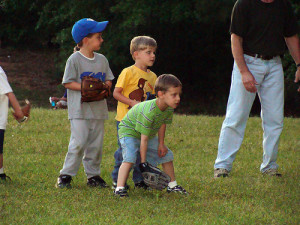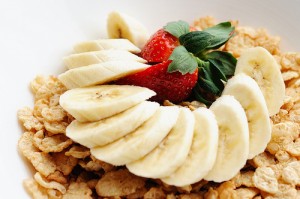by Michelle Sutton-Kerchner
As summer winds down, fall activities get into swing. It may not be a marathon, but it sure can feel like it. Train for it …
Families everywhere are in back-to-school mode. Fall schedules and school supply lists arrive as swimsuits fade from well-worn days. Train for it! Even those without offspring can benefit from learning a few lessons before busier days arrive. Whether you have kids, a pet, or an inner-child needing to be nurtured, here are tips to keep the whole family healthy.
Take care of yourself. If you are wondering why self-care is mentioned first in the topic of family health, here are two simple reasons:
- Live by example.
- You must be well to care for others.

Cultivate yourself as a person to be admired. The goal is not to be perfect, but a work in progress, always trying to be better. Take time for your health. Do things to nurture your wellness. Your children learn by your actions, even the obstinate teen who thinks you are from another planet.
Share your experiences. After a healthy snack or brisk walk, share how you benefited. Perhaps you are energized or motivated by accomplishing something healthy for yourself. If you find yourself short-tempered, announce your stress-busting plan. It may be a 5-minute timeout for meditation, or a quick stretch session. Give your kids the opportunity to learn how you deal with stressors.
Discover other outlets for stress. Ask your family which activities help them de-stress. Incorporate them into your routine. Emphasize physical activity for maximum tension relief. For your spouse, it may be a quick swim after dinner. The kids may benefit from rhythmic rope jumping or time on a swing-set. Help each other find ways to distract from worries with a healthy outlet.
Then, find a relaxing activity during which you can discuss those daily worries and irritations before they develop into bigger issues. Stress occurs at all ages. Don’t belittle a preschooler’s squabble or high-schooler’s dilemma. Casual discussions where the focus is often on a task at hand, like a puzzle or molding clay, actually help kids open up and share. Experts say they feel less scrutinized and self-conscious, which allows them to talk more easily about feelings.
Learn to enjoy exercise. Before you utter a complaint about having to fit in your workout (everyone does sometimes), close your mouth. Evaluate. If you dread exercise on a regular basis, then your workout is a misfit. Work with a personal trainer to create a program you enjoy. Try a new Group Fitness class. Make a splash in the pool. Fitness should be fun, and that should be reflected to loved ones in your life. You cannot be an advocate for healthy living if you constantly complain about your choices.

Exercise is disguised in many family fun activities. It should not be treated as a chore. Avoid causing sleepyheads to rise early and execute a routine of crunches and jumping jacks, followed by a breakfast of unidentifiable oats. Where’s the fun in that? Make physical activity your family’s lifestyle. They will exercise every day without even being aware. Exercise disguised as fun includes:
- Growing a garden.
- Playing catch, tag, or other backyard games.
- Going on a hike or walking the neighborhood.
- Going on a search for random findings (blue cars, white dogs, cute boys — okay, the last one only works if you’re with teenage girls).
- Bicycling, skating, or skateboarding.
- Swimming and other water activities. Loosen up with water yoga. It might elicit some laughs, too.
- Playing! Learn how to play again. Have a child teach you this art. Build a fort, set up a tent, create things, crawl, jump, skip.
- Getting silly. Rediscover ab muscles with a hearty belly laugh.
Be a good student. Let youngsters in your life know you are open-minded and willing to learn. Being seen as an expert at something builds confidence. Have a child teach you a skill, perhaps a magic trick, handstand, or deepwater diving. Show yourself in a new light: Someone who acknowledges you don’t have all the answers or skills but is willing to learn. You finally may be taught how to go under water without holding your nose!
This is a special way to positively reinforce the healthy activities that are your kids particular talents. It also strengthens the give-and-take of your relationship.

Be breakfast eaters. Breakfast helps regulate body weight by preventing food binges later in the day. It helps jump start metabolism after a night of sleep. Some experts believe the simple act of eating breakfast makes individuals more likely to make healthy choices the rest of the day.
Children, who need to eat at regular intervals to fuel growing bodies and brains, especially benefit from breakfast. This simple morning habit can help improve concentration and overall school performance. Children who eat a healthy breakfast are more likely to be physically active, including in sports. Be creative with breakfast; munch on leftovers. Be boring; eat dry cereal on the go. Just be healthy in your choices. A vehicle doesn’t travel far with bad fuel.
How Does This Lifestyle Help?
Healthy habits formed when young are a lifelong investment. If you start life learning the value of fitness and health, this lifestyle is never questioned. Consider this– We don’t arrive at 30 years old and suddenly ask, “Why brush my teeth?” We always have, for our health. It is a given. Fitness and other healthy choices can be developed the same way when created at a young age.
Enjoy fun physical activities as a family to reduce stress, boost the immune system, and stay fit. It provides time to unwind together. Your only time together isn’t spent rushing in opposite directions, battling over homework, or running to the car. Family can be experienced as the healthy support system it is.

Research also attributes exercise to lower physiological reactivity to stress. In addition to helping cope with current stress, exercise is thought to build your tolerance for future stress. Consider your workout a painless immunization against stress meltdowns, with excellent side-effects.
Make fitness a rewarding part of your family life. Show them how to love healthy habits that will energize for life.
Sources
“Breakfast for Kids Can Be Healthy and Fast,” by Diana Rodriguez at www.everydayhealth.com.
“Exercise and Stress Relief: Using Exercise as a Stress-Management Tool,” by Elizabeth Scott at www.about.com.
Image Credits
Sunset on summer (introductory photo): www.flickr.com/photos/disoculated/5827344052/
Playing catch: www.flickr.com/photos/justjennifer/3511539246
Breakfast: www.flickr.com/photos/ralphandjenny/4436764804
Healthy school kids: www.flickr.com/photos/usdagov/6238791336. Photo by Lance Cheung.
 Fitness & Wellness News Your Source for Fitness News, Wellness News, Health News, and Nutrition News!
Fitness & Wellness News Your Source for Fitness News, Wellness News, Health News, and Nutrition News!




